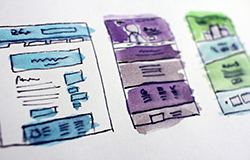Last Updated on April 10, 2023
You already know that writers with significant social media followings can be more desirable to agents and publishers. Since Facebook is still the market leader in the digital space — ahead of Twitter, Instagram, and Pinterest, for now — that makes it as good a place as any to begin your marketing strategy.
For writers, the question then becomes whether to have a Facebook Page or Profile — and there is a very distinct difference between the two. Every user by default has a Profile, which is also known as a “personal timeline” and is intended for the personal use of an individual. A Page, on the other hand, is used for commercial purposes, such as marketing a brand, product, or a public figure, such as an author.
With few exceptions, I have advised almost every writing client I have worked with to create a Page rather than a Profile. Here's a quick breakdown of the benefits of each, from a writer's perspective.
Benefits of a Facebook Page for Writers
- Pages are best for branding. As a writer, you are a brand, just as surely as Pepsi and Apple are. Facebook Pages were made with brands in mind and so contain numerous features that will aid you in reaching more eyeballs. The features of Profiles pale in comparison.
- Easy incorporation into your website. Want “likes”? Facebook makes it easy for fans to “like” your Page from other places on the web, such as your website. Simply add a predetermined code to your website header and you can start collecting more “likes” without users having to even visit Facebook.
- Detailed stats. While Facebook's statistics are still lacking the robust detail of Google Analytics, there's been a vast improvement in the past few years. Now you can see how many people your content has reached, which posts have performed the best, which content has been shared the most, etc. This sort of info is crucial for planning your social media strategy.
- Multiple admins. Pages offer the ability to assign multiple administrators, which means you can have an outside company or intern help with your Page management without having to compromise your personal password.
- Fans expect to interact with a Page. By now, Facebook users are quite familiar with Pages and all they entail, so they might feel confused by the experience of interacting with a public figure's Profile. Neil Gaiman and Paulo Coelho are two established authors who have made great use of Facebook's Page platform.
- Separation of public and private info. Although you can control the privacy of individual Profile posts, it's far easier when you have two accounts so that your fans don't see your interactions with your real-life friends.
- Customization. Add links for events, books, and all manner of other features for your fans. Another thing you can't do on Profiles.
- Advertising. Only Pages can advertise, not Profiles. This means that when your new book is out, you can promote it using your Page. Good luck reaching that many people with your advertising-phobic Profile.
- Number limitations. Profiles allow only 5,000 friends, but the number of fans a Page can have is unlimited. Sure, people can subscribe to your Profile's feed, but not many people are aware of this feature, so it's underutilized, meaning the numbers won't be as impressive to agents and publishers.
Benefits of a Facebook Profile for Writers
- You need to have a Profile to have a Page. Why manage two accounts when you can manage just one? Don't create more work for yourself. That time is better spent writing.
- Your Profile already has thousands of friends/followers. It can be difficult to start from scratch, so you might be better off sticking with the adoring public you've already amassed on your Profile.
Facebook is constantly changing their rules and functionality, so some of these points might evolve over time. However, the fact remains that Facebook created Pages for a particular purpose, and that purpose just so happens to align with your goal as a writer: to get your name and your work out there.
Now, should your Page have your name or your book's title? That's a subject for another post altogether, so leave a comment letting us know if you're interested in hearing more about it.
© Jenna Rose Robbins. To reprint this work, please contact the author.
- Facebook Tips for Writers: Profiles vs. Pages - November 25, 2013



